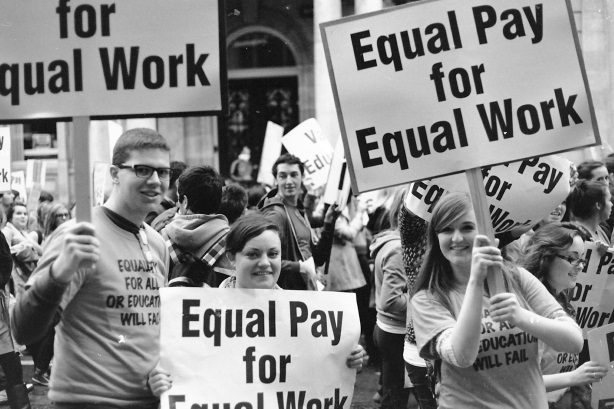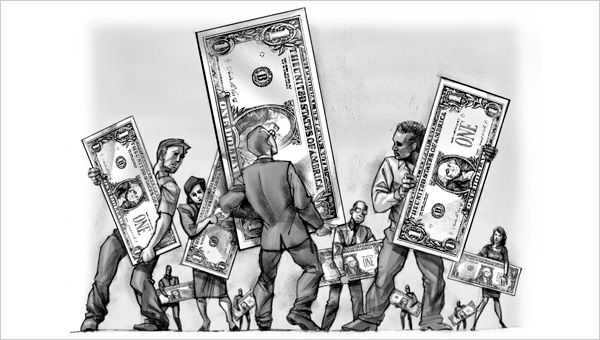Equal Work? Government Has No Idea What That is
“Equal pay for equal work!” the mantra goes. “Women get only 73 cents on a man’s dollar!” These are oft-heard slogans, and we may well hear them again during the fall campaign with the War on Women afoot. Now, going beyond the rhetoric, it’s not widely known but nonetheless true that the intersex pay gap is attributable to different career choices men and women make: women tend to choose less lucrative fields (e.g., soft sciences instead of hard ones), work shorter hours even when “full time,” are more likely to value personal fulfillment and job flexibility over money, are more inclined to take time off, generally have less job tenure and more often decline promotions. But while I’ve examined these factors at length in the past, the topic today is something more fundamental. This is that there would be a problem with even a well-intended equal-pay-for-equal-work scheme:
Hardly anyone knows what equal work is.
And the government hasn’t the foggiest idea.
Recently I mentioned how women tennis players now receive the same prize money as the men at Grand Slam events (Wimbledon; and the US, French and Australian opens) and how this is hailed as a victory for “equality.” Yet since the women still only play best of three sets but the men best of five, this actually means the men must work longer for the same pay. Even this, however, doesn’t truly illuminate the issue: what actually constitutes “equal work” in professional tennis?
I’ll introduce the point with another example. The top 10 female fashion models earned 10 times as much as their male counterparts in 2013. Is this unequal pay for equal work? Not really.
While I don’t know if women models’ job is more labor intensive, I know they don’t get paid because they’re capable of posing, wearing clothing, standing under hot lights or parading down runways. It’s because their “work” helps to satisfy a market — and it satisfies a bigger market than the men’s work does.
Note here that while people today frown upon discrimination based on innate qualities, integral to doing the women models’ work is being female. If the male models were women, they might be able to do the same “work” and satisfy the market equally.
Likewise, does the “work” in tennis directly have to do with number of sets played? As an aspiring 12-year-old tennis nut, I’d sometimes play 10 sets a day under the sweltering summer sun, but no one thought of compensating me and I never felt oppressed. Professional tennis players earn money because they satisfy a market, and the men’s “work” does this more effectively than the women’s. And how would we characterize this more valued work?
It is success on the men’s tour — people want to see the grandest stage in the game.
Thus, the only way a woman in tennis could do work equal to that of Roger Federer or Rafael Nadal is to compete on, and succeed equally on, the ATP Tour. Of course, a woman who could would not only enjoy the same prize money (it’s greater in men’s tennis overall), but would become a sporting sensation and might very well receive endorsements dwarfing the men’s. So her “work” then could actually be greater.
There are endless more mundane examples. A woman gynecologist I know will only hire female assistants because she believes it makes her patients more comfortable. Not only is this an example of why sex discrimination is often justifiable, but what if she was forced to hire a man? If the patients were indeed less comfortable — and, therefore, perhaps less likely to visit her practice — would that man truly be doing “equal work”?
Now consider female police officers. Forget for a moment that standards on forces were long ago lowered to accommodate women based on “disparate impact” theory and that Eric Holder is currently suing the Pennsylvania State Police for treating women equally. Imagine a study found that people in general, and the criminally inclined in particular, found male officers more imposing and therefore were more likely to mind their p’s and q’s around them. Would, then, even a highly competent female officer be able to perform “equal work”? And if not, and reflecting the phenomenon with fashion models, wouldn’t being male (or at least appearing so, to head the “transgender” argument off at the pass) be integral to the “work” of policing?
What of a female reporter in male athletes’ locker rooms? Not only wouldn’t it be allowed if the sexes were reversed, but if those men were less comfortable and less likely to be forthcoming in their comments — or even if they just had to modify their behavior — could her “work” really be equal to that of a male reporter’s?
Next, my local hardware store provides knowledgeable workers, all men, who render valuable advice on products and how to perform various home repairs. If it was determined that people found a female in that role less credible and were then not quite as likely to buy from the establishment, would even a highly competent woman be able to do “equal work” in that capacity?
What about the little West Indian restaurant, with all-black workers, I loved when I spent a few weeks in Tampa? If hiring a white person made the eatery seem less authentic and negatively affected its appeal, would that individual be able to do “equal work”? The same, of course, could be asked about a black person working in a German restaurant. In these cases race would be integral to the “work.”
And what of a homosexual Boy Scout troop leader? If his presence made parents less likely to enroll their boys in the organization, could he be capable of “equal work”?
Of course, one knee-jerk reaction here is to say that people “shouldn’t” view female cops or hardware specialists, or homosexuals differently than anyone else. But this is a moral argument of questionable morality, as it applies a bias in selectively objecting to market biases. People take little issue with gynecologists or day-care centers that won’t hire men, with male models being paid less or with ethnic restaurants hiring only non-whites. But try only hiring only male cops or employees; compensating a male hardware specialist more handsomely; or, as with Abercrombie a few years back, valuing employees who don’t wear hijabs over those who do. You may have an experience with the DOJ or EEOC that’ll make a dance with the IRS seem pleasant.
We could also talk about how we “should” value work. If we were deific or at least angelic, we would certainly value a mother-of-four’s labors or Mother Teresa’s loving charity more than Facebook and completely devalue rappers’ vulgarity. And even though I earn less than mainstream-press profferers of pablum, I consider my work infinitely more valuable. But flawed though market determinations may be, they’re still the best guide available.
Even within this worldly context, though, some may say there’s more nuance to the matter of work than my examples express. They may contend, for instance, that female police and hardware specialists might have strengths that counterbalance or even outweigh their weaknesses. And guess what?
I agree.
My examples could possibly be lacking.
And this just buttresses the point: virtually no one — if anyone — can properly assess what constitutes equal work in every situation.
This is yet another reason why the matter of work and pay is none of the government’s business. Are bureaucrats, politicians and judges qualified to determine what equal work might be in the thousands of professions in America? Government isn’t God; it’s not even the market, which can be defined as economic democracy expressed through purchasing decisions. When it intrudes into the economy it’s more like Hitler trumping his generals during WWII and deciding on military strategy: an autocratic agency as incompetent as it is arrogant.
Contact Selwyn Duke, follow him on Twitter or log on to SelwynDuke.com
EDITORS NOTE: The featured image is of students and teachers uniting on the streets to protest for equality. Picture Credit


